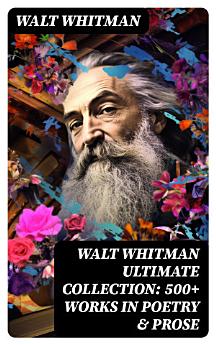WALT WHITMAN Ultimate Collection: 500+ Works in Poetry & Prose: Leaves of Grass, Franklin Evans, The Half-Breed, Manly Health and Training, Specimen Days...
Walt Whitman
Nov 2023 · DigiCat
Ebook
1930
Pages
family_home
Eligible
info
reportRatings and reviews aren’t verified Learn More
About this ebook
In "WALT WHITMAN Ultimate Collection: 500+ Works in Poetry & Prose," readers are immersed in an expansive tapestry of literary genius that captures the essence of 19th-century American life and philosophy. Whitman's free-verse poetry, particularly in 'Leaves of Grass,' offers a revolutionary departure from traditional poetic forms, emphasizing naturalism, individualism, and a profound connection to the human experience. The collection includes an array of essays and prose that reflect his democratic ideals and transcendental beliefs, showcasing his mastery of language as he articulates themes of love, spirituality, and self-identity against the backdrop of a burgeoning nation grappling with its own identity. Walt Whitman, often regarded as the father of free verse, emerged from the tumultuous context of the American Civil War, which profoundly influenced his writing. His background as a journalist and a dedicated advocate for social reform infused his work with a sense of urgency and authenticity. Whitman's exploration of the self and the collective experience of humanity was groundbreaking, positioning him as a significant figure in American literature and the broader canon of world literature. His deep empathy and understanding of diverse human experiences resonate throughout this comprehensive collection. This ultimate collection is an essential compendium for any literature enthusiast or scholar, as it provides not only a thorough compilation of Whitman's profound insights into humanity but also serves as a testament to the enduring power of poetry. Readers will find themselves challenged and inspired by Whitman's evocative engagement with life, making this collection a valuable addition to the libraries of both casual readers and scholars who seek to understand the evolution of American thought and literature.
About the author
Walt Whitman (1819–1892) was an influential American poet, essayist, and journalist whose work boldly revolutionized the form and content of 19th-century American poetry. His magnum opus, 'Leaves of Grass,' originally published in 1855, was revised and expanded throughout his lifetime, and it stands as a landmark in the transition from transcendentalism to realism, embracing both views in a unique synthesis. Whitman's poetry is characterized by its free verse style and candid explorations of sexuality, nature, and the human spirit. He was often referred to as the father of free verse, breaking away from the strictures of traditional meter and rhyme to create a new, uniquely American poetic voice. In addition to 'Leaves of Grass,' his other works are compiled in collections such as 'WALT WHITMAN Ultimate Collection: 500+ Works in Poetry & Prose,' which showcases his extensive body of work beyond his most famous publication. As a poet and humanist, Whitman's work expressed his optimistic belief in democracy, the individual, and the interconnectedness of all living things, reflecting the diversity and vitality of the burgeoning American nation. His influence remains significant in the realm of American literature, resonating with later generations of poets and thinkers who pursued authenticity and a profound appreciation for the self within the collective experience of humanity.
Rate this ebook
Tell us what you think.
Reading information
Smartphones and tablets
Install the Google Play Books app for Android and iPad/iPhone. It syncs automatically with your account and allows you to read online or offline wherever you are.
Laptops and computers
You can listen to audiobooks purchased on Google Play using your computer's web browser.
eReaders and other devices
To read on e-ink devices like Kobo eReaders, you'll need to download a file and transfer it to your device. Follow the detailed Help Center instructions to transfer the files to supported eReaders.








